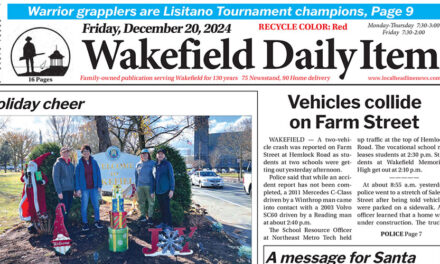Published in the April 4, 2019 edition.
By BOB BURGESS
WAKEFIELD — Development, diversity, transparency, Wakefield’s financial health, a proposed Charter change and the selection of our next police chief were among the issues batted around by those who would be town councilors during a forum Monday night.
Hosted by WCAT, the debate showcased differences between this year’s Town Council candidates: incumbents Ann Santos, Tony Longo and Peter May, and Finance Committeeman Jonathan Chines. They are running in a race for three seats on the council, to be determined at the April 23 municipal election.
Moderator Bill Carroll kept things in order. The Item’s Mark Sardella and Room To Write’s Colleen Getty asked questions. Getty’s came from local voters’ submissions.
Chines certainly struck a nerve with the three incumbents when he questioned the process used to hire Lt. Steven Skory as the next chief of police.
His comments came when the candidates were asked to give their definition of “government transparency.”
Chines, who was a parent volunteer on the search committee that helped find Walton School Principal Elaina Byrne back in 2017, said those in government should take a proactive approach in communicating with their constituents, giving them every opportunity to engage and to have a say in how their community is run.
He then talked about the need for professional processes. These, according to Chines, should include the way Wakefield searches for and hires a police chief, which Chines believes should have been much more wide-ranging, thorough and involved all manner of “stakeholders.” When the School Department was looking for a new Walton leader, Chines said the search committee made sure the process was a very open one.
He said there wasn’t even a job posting for the chief’s position once Rick Smith announced his retirement.
The challenger’s comments didn’t sit well with the three incumbents, all of whom were among the councilors who unanimously voted last week to promote Lt. Steven Skory as chief when Smith retires in a couple of months. Skory has been one of Smith’s top advisors for several years, and like fellow lieutenants Scott Reboulet and Craig Calabrese, has been groomed to take over the top spot in the department.
Ann Santos said that “government transparency,” or the alleged lack of it, is a “bit of a dog whistle” when people disagree with a certain outcome. She then said the search to find Smith’s successor was one of integrity and that there were procedures that were followed.
Town leaders, including Town Administrator Steve Maio and Smith, have “been working for years to develop quality police lieutenants and any one of them could have taken over,” Santos said.
Longo explained, as Santos did, that there were three “excellent” candidates to take over for Rick Smith. Longo said he met not only with the three lieutenants and sought input from Smith and Maio, but also met with other members of the Police Department, many of whom turned out last Monday at the councilors’ meeting in support of Skory as the next chief.
Peter May actually read from a section of the Town Charter as part of his response. It is Maio’s responsibility to make a recommendation of a new police chief to the council, which then decides whether to ratify that recommendation.
“The process,” May continued, “was very transparent.”
The candidates were asked whether they thought the town was being overdeveloped, and if there was a plan to handle development.
Longo said he has opposed some recent projects brought before the town, specifically the 190-unit, three-building 40B development of Tarrant Lane off Hopkins Street and the 27-unit 40B proposal on Main Street in Greenwood. The impact to the town’s infrastructure and Wakefield’s school system concern him in the first project, Longo said, and the Greenwood project is too big, creating a “fragile parking situation.
He said the move toward so-called smart growth — where residences and businesses are put in the same place, close to bus or train lines — is a good thing, but officials should be able to negotiate with developers to ensure advantages to the community.
Peter May used the North Avenue building housing the Tonno of Wakefield restaurant as a prime example of smart growth done right. He said officials are keeping the town “alive and moving forward” as far as development goes, adding there should be a combination of different types of construction.
Chines said the town must consider each project individually, explaining he did not want to see the overdevelopment of green spaces in Wakefield, or development that changes the character of a neighborhood.
Santos said the town has a well-thought-out plan for how Wakefield is developed and is following it. Mixed use development has been adopted and has led to some very creative projects in town, she continued.
Additionally, the town boards that deal with planning and development demonstrate that Wakefield can collaborate with builders, and they work well together.
The hopefuls were asked whether town government could be more diverse.
May said the Town Council, Town Administrator Stephen P. Maio and others are doing much more now to try to get committees and boards to be more representative of the ever-changing face of our community. In fact, from last May to this February, 70 percent of those appointed by the Town Council were women, he continued.
When there are openings on committees and boards, the town advertises them extensively on all available platforms. “We’re very conscious of (being as diverse as possible),” May said. “We can’t force women to join” town government, “but we can get the information to them.”
Chines said there is a lack of diversity in government, continuing that the town needs to reach out proactively to invite people into the governing process and officials need to do a better job getting information out.
“We have to reach out to them,” he said.
Santos said diversity is very important to her, demonstrated by the successful push she helped lead to change the name of her board from selectmen to Town Council. She said the town needs to embrace inclusion and let everyone know they have a place at the governing table.
She went on to say that the creation of groups like the local Human Rights Commission is another example that the town is doing much more to be diverse than it did in the past.
Longo said that when openings on town boards and committees are created, “I have a responsibility to pick the most qualified people for the position.”
All four Town Council candidates support a change to the Charter that would increase the number of signatures needed to call a referendum election on a Town Meeting vote. Advocates for the change say it’s too easy now to overturn the work done by faithful Town Meeting participants.
Chines said the change from 200 signatures to 2 1/2 percent of registered voters speaks to the need for increased participation at Town Meeting and in town government in general. He suggested proxy Town Meeting voting, alternative days for Town Meeting and supplying free babysitting service at Town Meeting as other ways to increase participation.
Santos said the Charter change does not represent “voter suppression,” as some have claimed. People have to work a little harder to get a Town Meeting decision overturned, she said.
Longo and May mentioned the actual issue that led to the Charter change proposal: the Town Meeting approval, and eventual special election rejection of improvements to the Public Safety Building.
Longo said Wakefield has one of the lowest thresholds in the area for calling a referendum vote. This Charter change needs to be done to bring Wakefield into the 21st century, he concluded.
May said the proposed improvements to the Public Safety Building involved hundreds of people and 2 1/2 years of study before it was brought to Town Meeting floor, where 80 percent of those participating approved it. He said it was “horrible” that this kind of work was overturned because 200 people signed a petition.
Many communities around Wakefield are struggling with municipal finances, but here it is a much different story. The candidates were asked why this is.
Longo said there is $10 million in all reserves combined, the town has a AAA bond rating which makes it cheaper to borrow money and credited Maio, the Town Council and the Finance Committee for the situation.
May said the Maio and the council have been keeping any budget increase from year to year to about 2 percent, the residents are not being overly taxed and voters won’t see an override of Propositon 2 1/2 being requested to help run municipal government like the one passed in Melrose Tuesday.
Chines said there have been positive steps taken, but said everyone should be mindful that “we’ve had a good economy here” and that money has been taken from the reserve accounts in recent years.
Santos said the town is in great financial shape because of the relationship the Town Council has with Maio, the Finance Committee and department leaders.
“We’re doing well. We are spending some of the surplus, but we have the foresight to be thoughtful of how we do it in the future,” she said.
The candidates were asked if the Town Council should take stands on state or national issues that are beyond the purview.
May said he is a Wakefield-centric councilor who feels the council needs to concentrate on the shape of the town’s schools and its infrastructure, among other things. He said “you can get lost” talking about state and national issues. “We have representatives who do that for us,” he added.
Chines said it is the job of a councilor to speak up for the citizens of Wakefield, and sometimes that means weighing in on state and national matters. He used the November state ballot question that would have overturned transgender protection as a prime example. If that had passed, he said, it would have made a “real impact” on people here.
“We have values” in this town, he continued, “and we have the right to say that.”
Santos said she is comfortable taking stands on issues like gun reform given that shootings have happened in schools, among other places, and weighing in on the national opioid crisis. “I can look at all issues,” she said.
Longo said the Town Council must look at particular issues “one by one” and talk about those that are relevant to Wakefield.
All four Town Council candidates said the time has come to address the aged and failing Wakefield Memorial High building.




